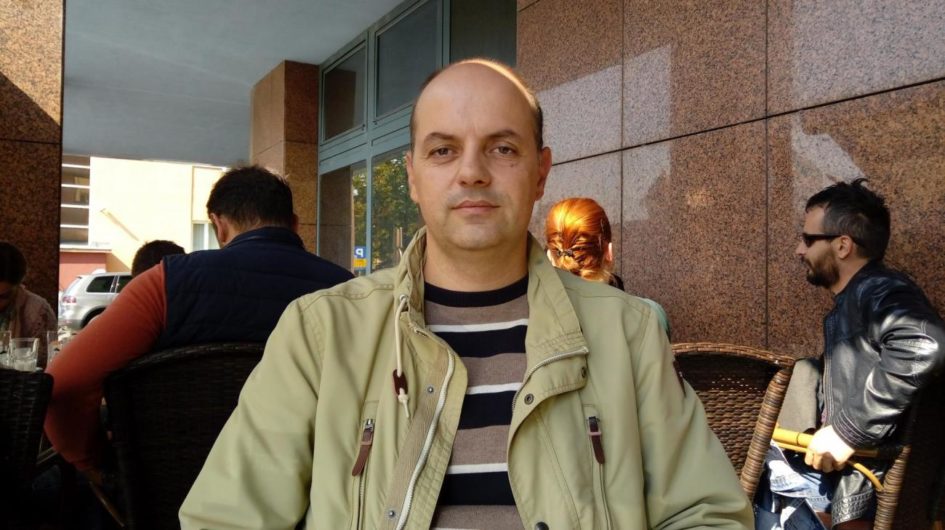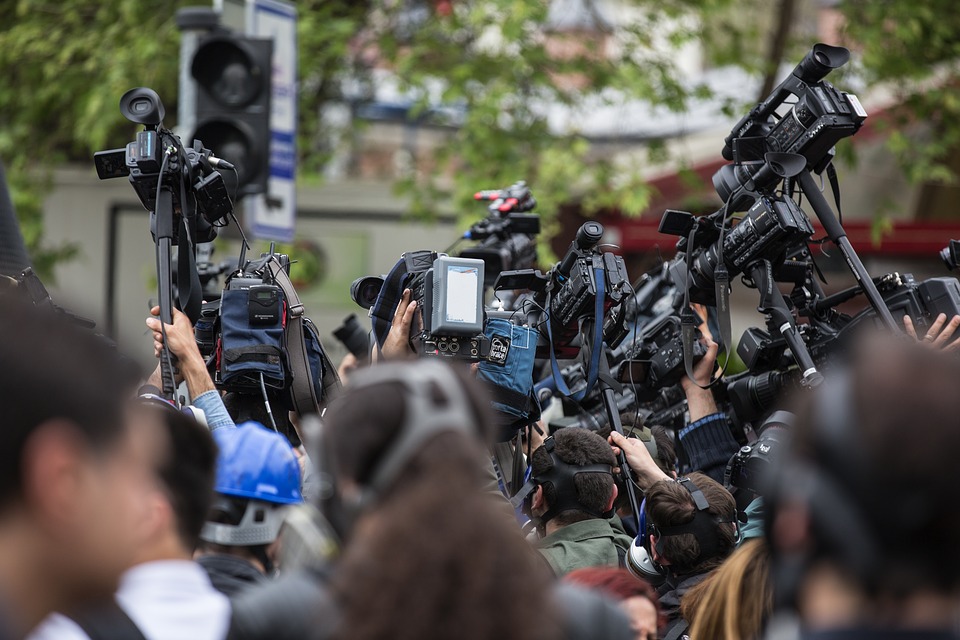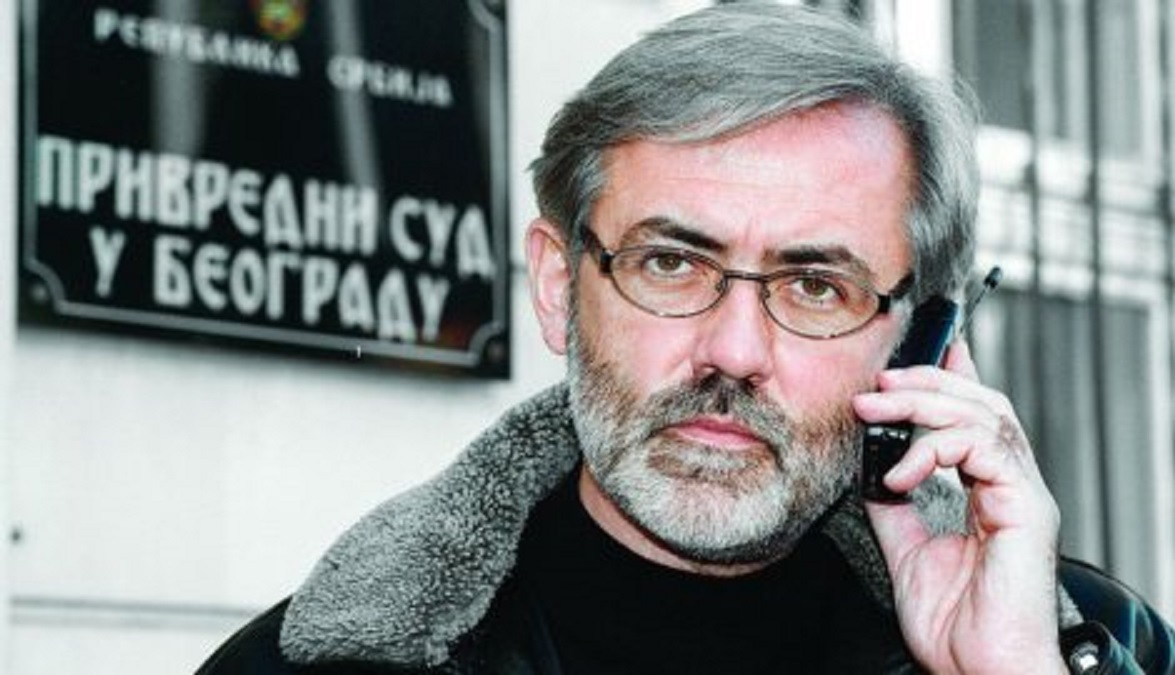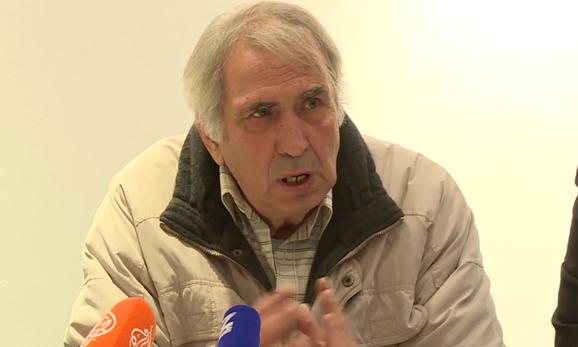BELGRADE, 24.12.2018. – It began with the text “Curuvija awaited bombs”. Then Ćuruvija was welcomed by bullets. For years, the family and colleagues of the murdered journalist have waited for the investigation to be completed and to begin the trial for his killers.
It’s been almost five years since the current President of Serbia Aleksandar Vucic announced that the murder of journalist Slavko Curuvija who was killed on Easter Sunday 11 April 1999 was resolved. However, even the first instance verdict has not yet been issued and the trial is now coming to end in the Special Court (Department for
Organized Crime of the Higher Court in Belgrade). The trial was followed by pressures on the prosecution witnesses, many obstruction and illegal decision of the trial chamber which tried to to extract some of the key evidence from the proceedings.
|
The far end of the trial
The first instance trial for the murder of Slavko Curuvija in the Special Court is in its final stages and the evidential processs is expected to be finalized on December 25th. And the closing terms are scheduled for 24, 25 and 29 January. After delivering the verdict, the Appeals Court in Belgrade will decide on the complaints of the Prosecution and the Defense. The Court of Appeal will be able to confirm the verdict, amend it, or return the proceedings to a new trial. So the date of the final end of the trial seems to be far away.
|
On 14 January 2014, when Milan Radonjic was arrested , at the time of the murder he was chief of the DB Belgrade and assistant of chief DB{State security}, and now accused of being the organizer of the murder. Ratko Romic was at that time the chief inspector in the second administrations (intelligence) DB, and now charged as a co-perpetrator. It seemed that everything would be just simply and efficiently. In addition, the case was also initiated against the former chief of the DB Radomir Markovic accused for ordering that action who was already in jail serving the maximum sentence for other political murders and Miroslav Kurak, an instructor of the JSO accused as an immediate killer, who is still on the run, in Africa.
Testemony of Ulemek
Before that, on 8 January 2014, the official declaration was made by Milorad Ulemek Legija, commander of the Special Operations Unit (JSO), who is now serving the maximum sentence for a number of political killings. He appointed persons which are now accused for the murder of Curuvija. He testified that at first Markovic asked him to kill someone.
“I arrived on the 29th or 30th of March 1999 with a helicopter from Kosovo to Belgrade because I was invited by chief Markovic. I met him in the office of his assistant, Frank Simatovic (remark by the author: Simatovic, the founder of the JSO, who is being tried in The Hague. On the day of the murder of Ćuruvija he telephoned the accused Kurak and Radonjić, before and after the crime) and reported him on the situation on the ground. After that Markovic brought me into the hall and asked me to carry out one more liquidation. He told me: It is necessary to remove one person who currently seriously jeopardizes the security of the country by his hostile activities”, testified Ulemek to the Deputy Prosecutor for Organized Crime Milenko Mandic on 8 January 2014. Ulemek then stated that he is refusing an order to kill him justifying it that he and his unit was engaged on the ground when NATO bombardment started on Kosovo.
He testified that after twenty days, when he realized that the volume of tasks in Kosovo is smaller, offered Markovic that his can unit still perform the task, but chief answered: “It is already completed.” In the meantime Curuvija was killed on 11 April. According to Ulemek’s testimony, when he negotiated with Markovic in 2000 the action of arresting a person, the head of the DB told him that the help would be provided by “these Radonjini, who killed Ćuruvija”. In the hallway, in front of Markovic’s office were Ratko Romic and Miroslav Kurak, so Ulemek concluded that they were the ones on whom the chief of the DB spoke, because he arranged with them the ordered arrest action.
Zemun gang confirmation
That Ulemek knows who killed Curuvija was confirmed two days later, on 10 January 2014 by two members of the Zemun clan, brothers Alexander and Milos Simovic. They then testified that in the second half of 2000, Ulemek showed Kurak and Romic in club “Mumbai” and said;
“Remember them well, they have done Curku you need to clean up, must not be a mistake”. They told that Ulemek said that Curuvija was killed from “state reasons” and that Kuřák and Radonjic “should remove for interest of the Service”. Simovic gave testimony that the “Zemun Clan” was engaged in murder Kuřák and Romic, but that it was later rejected. Aleksandar Simovic testified that now the late Zemun clan leader Dusan Spasojevic-Siptar said that behind the murder of Curuvija “is the family of President Milosevic because of some articles that Curuvija wrote about them.”
Their testimony of the planned killing of Kurak and Romic was also confirmed by two witnesses in the proceedings for the murder of Prime Minister Zoran Djindjic and other crimes committed by Zemun clan Dejan Milenkovic-Bagzi and Miladin Suvajdzic-Djura Mutavi. Milenkovic testified: “I later heard that the liquidation of Kurak and Romic for the murder of Curuvija was planned.”
Base stations and Duty Logs
In order to initiate the proceedings in addition to these testimonies also was crucial and evidence collected after democratic five-year changes in 2000, when Slobodna Milosevic was removed. These are the testimonies of individual members of the DB, and as material evidence, discs with recorded calls from the base stations of mobile telephony and DB Deployment Logs.
The list of calls from the base stations revealed that on the day of the murder on April 11, 1999, the day before, the accused as perpetrator and co-perpetrator Miroslav Kurak and Ratko Romic were at the scene of the murder. He also overturned the alibi of the accused for organizing the murder of Milan Radonjic, as well as Romic, where they were at the time of the crime. Calls from Romic and Kurak were stored at the base station on Radio Belgrade and that part (then the base stations had three parts facing three directions that determined only the position of the caller) facing Svetogorska Street where in the passage 35 was killed Curuvija. The two of them talked to each other several occasions and they also called Radonjic.
The testimony of the witnesses from the investigation found that Radonjic, which he confirmed, as soon as he was appointed as the Chief of the Center of DB Belgrade on 5 April, ordered verbally that Ćuruvija needs to be followed 24 hours. For example, Stevan Nikcevic, in that time deputy of Radonjic, and Vladimir Nikolic, chief of analytics at the DB Center, testified at the trial that the order of their boss for monitoring Ćuruvija was “extremely abnormal and atypical”, since the former chief of the Center had never been directly involved in secret escorts and issued orders.
Nikcevic disputed the indictment of Radonjic that he allegedly informed him that Curuvija had been killed. Agent Predrag Gikic, who was in charge of Ćuruvija, testified that he had not been informed that the team continued with the escort of Ćuruvija. Also his earlier recommendation that there was no operational reason for the journalist to tail was not respected. For 24 hours, Curuvija was followed by all 27 members of the 9th Secret Unit escort unit of the Belgrade DB Center and they testified about it.
Attempted murder and murder
For April 10, 1999, when the investigators suspect an attempted murder, the base station reveals that Kurak was at Radio Belgrade in Svetogorska. From that place he called Romic at 14 hours 10 minutes and 39 seconds. Romic`s calls from the same place are then registered. He called Radonjic at 14.19.53, and Kurak at 15.27.13.
The Duty log dated 10 April 1999 stated that the head of the 9th escort unit, Zoran Pavic, and the shift chief at the DB Center, Dragan Pavic, were invited to a report by Radonjic because they did not obey to immediately report the slightest change of Curuvija`s movement. According to the testimony of DB members, Radonjić shouted at them because on April 10th, they did not report in time that Ćuruvija headed for the apartment.
On the day of the murder, April 11th, in the Duty log it was written that Curuvija and Branka Prpa came out from Svetogorska 35 at 13.55, a minute later they were at the Politica building and then moved to the Russian Emperor’s café. Radonjic’s order was also recorded: “Let me know immediately if they go home, maybe we will take some other measures.” Some witnesses from the DB stated that the only remaining legal measure was the arrest of Ćuruvija, but he was killed.
When Ćuruvija and Prpa headed for the apartment, it was recorded in the Duty log that Radonjić at 16.25 ordered the immediate cease of escort. The DB escort members testified that they indeed received that unusual order from Radonjic. After that in 16.28,13, Radonjic calls Kurak. Romic was registered by the base station near Svetogorska street where Curuvija and Prpa passed by. He calls Kurak in 16.38,13, and Radonjic in 16.39.08. Then Radonjic at 16.45.31 called Kurak. Ćuruvija was killed in a passage where he lived in Svetogorska 35, between 16.39 and 16.45 hours. According to the prosecution, Romic was following Curuvija and Prpa from the building of Radio Belgrade, informed Kurak, who`s waiting in front of the passage, that they are arriving and then inform Radonjic to take the action. In the passage, as alleged in the indictment, Kurak shoots Ćuruvija while Romić with a weapon hits Prpa in the head.
The alibi falls apart
The determined time of the calls does not match the claims of Radonjic and Romic on where were they on the day of the murder. At the hearing in the Prosecutor’s Office on January 14, 2014, after being arrested with Radonjic, Romic said that on the day of the murder of Ćuruvija he was on 8 hours shift in the seat of the Second Administration of the DB in Dragica Marković Street in Teachers’ Village , and he does not recall whether was at a family lunch or dinner in Borca, where he lived at the time. However, base stations reveal that on April 11th he was at the crime scene just before the murder and his calls were registered by the base stations in Zvecanska 7, Takovska 2 and Francuska 81.
Radonjic as well claimed that on the day of the murder he was in the Second Board of the DB in Dragica Markovic. He said he briefly went to the family Easter lunch at wife’s parents home, ” in the vicinity, perhaps three minutes by car” where he was informed about the murder. However, prior to the murder, his calls were registered by the base stations in downtown Belgrade in Vasina 2, Milan Rakic 35 and Takovska 2.
Following his calls it was registered that at the time of the murder he was in the 2nd Administration of the DB in Danica Markovic Street. After the murder, his calls were registered at the base stations near Mostar Loop, where the villa of DB was, after in Paunova 24, then in Marinkova Bara, then again in Danica Markovic, then Vojislav Ilić 145, Takovska 2, Venizelosova 1, and then again in Danica Markovic, and at the Mostar Loop. The official investigation for the murder of Ćuruvija began after the testimony of Ulemek and Simović brothers and then the trial followed. However, everything wasn`t as announced on January 14, 2014, by at the time First Deputy Prime Minister and Coordinator of Security Services, the President of the ruling SNS since 2012., and the current President of Serbia, Alekasandar Vucic.
| The murder of Dada Vujasinovic
Journalist Radislava Dada Vujasinovic was found dead on April 8, 1994 in her apartment in New Belgrade, and the pre-criminal procedure is still underway. The State institutions at the time promptly concluded the case as a suicide. The experts engaged by the parents of murdered journalist completed the expertise on February 23, 1995, excluding the possibility that Vujasinovic commited suicide.
Attorney of the family Branislav Tapušković, file criminal complaints against NN to the prosecutor’s office the same day. There was no response. The application is submitted again on July 13 the same year, again without answers, so they filed the new one on October 5th. Still no reaction from the prosecution. They are appealing to the court on December 18, the next 1996 year. Investigative judge then ordered the reconstruction, which wasn`t done until May 5th 1998.
The reconstruction report was completed on July 3, 2001, only after Slobodan Milosevic lost power. The parents then asked for super expertise. At the Institute in Novi Sad on May 5, 2005 forensic medicine expertise was held without ballistics. Afterwards, on May 30th 2008., the ballist from USA, Vlada Kostic, completed his expertise only to determine the same as the experts hired by the family 14 years ago did, that the journalist was murdered.
After that, at the end of January 2009, the Public prosecutor’s Office in Belgrade announced the beginning of pre-trial procedure for the murder of a journalist. The prosecution subsequently searched for another expert in the Netherlands. However, in 2016 the Dutch forensic institute in The Hague came to the conclusion that “the injuries sustained by the late Radislava Vujasinovic may be the result of murder, suicide or an accident”.
Findings of the Dutch Institute did not affect the Public Prosecutor’s Office in Belgrade, which continues preliminary investigation procedure for the murder of Dada Vujasinovic. Lawyer Branislav Tapuskovic, representative of the murdered journalist`s family, says everything is back in early 2016 and nothing has happened since then, in spite of the fact that there is a way to conduct the investigation.
“All the essential proves were removed and it is well known who did it. Finding the one responsible for that might lead directly to the one who ordered the murder. As a lawyer, I no longer had the opportunity or the authority to investigate further, “said Tapuskovic.
After the murder, documents journalist kept hidden with the money somewhere in the apartment were not found. The money left intact but documents were gone. Besides, family discovered that someone put a damaging magnet into her tapes with recorded interviews. The tapes with her last recorded story on the police selling weapons in Novi Pazar have never been found as well as the tape from the answering machine where last calls were recorded. The file with material for the book she`s been writing also disappeared.
The initial state investigation ignored her pulled out hair, as well as the presence of a different blood type drops, which as later was determined were on the armchair next to where her body was found.
Investigation for possible motives led to her last three published interviews. One article that refers to Borislav Jovic, a former high-ranking SPS official, got her sued. In the second interview, with Željko Raznatović Arkan, among other things she spoke about numerous, among other things, he announced a conversation with him about numerous and groving liquidations. She asked him, “Who is next,” and he replied: “You! Write that down freely”. And she did. The Prosecution’s attention was also prompted by her text on General Bozidar Stevanovic, who at the time became the new commander of the RV PVO. As turned out later, because of him she received numerous threats.
|

This article has been produced as a part of the project Western Balkan’s Regional Platform for advocating media freedom and journalists’ safety with the financial assistance of the European Union. The contents of this article are the sole responsibility of the Independent Journalists’ Association of Serbia and its authors, and can in no circumstances be regarded as reflecting the position of the European Union.










